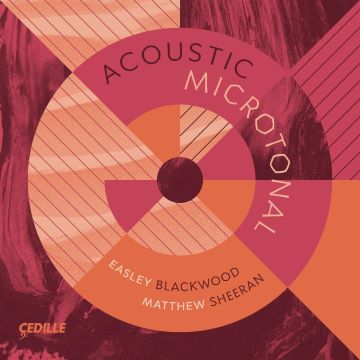Brilliant arranger Matthew Sheeran turns Easley Blackwood’s Twelve Microtonal Etudes for Electronic Music Media (1980) into an accessible, gorgeous chamber work.
Honoring the one-year anniversary of Chicago-based microtonal composer Easley Blackwood, Jr.’s death, Chicago’s Cedille Records (pronounced say-DEE) releases on Jan 19, 2024, Acoustic Microtonal, a new and unconventional acoustic presentation of Blackwood’s Twelve Microtonal Etudes for Electronic Music Media, Op 28 — arranged by Grammy-nominated composer and orchestrator Matthew Sheeran — that offers a fresh take on this unique work.
Rather than presenting it in the manner typical of microtonal compositions — performed by electronic instruments or a single, specially tuned acoustic instrument — the new digital-only album, Acoustic Microtonal, uses today’s most powerful recording technology to make Blackwood’s “impossible” notes possible for an ensemble of mixed-timbre acoustic instruments (woodwinds, brass, and strings).
To create the acoustic versions, Matthew Sheeran deciphered the original score — which comprises 180 unique pitches overall — and arranged 12-note versions of the Etudes by approximating the musical logic and sound of each. Musicians from the Budapest Scoring Orchestra performed the new parts on acoustic instruments, which Sheeran recorded and microtonally re-tuned using the latest music software (Celemony/Melodyne), bringing a new level of realism to the Etudes.
It is difficult, even impossible in many cases, to perform the microtones in these etudes on standard Western instruments, which are all constructed with conventionally tuned music in mind. It is for this reason that Blackwood originally composed his etudes for “Electronic Music Media.” He even cautioned against attempting to perform these works on acoustic instruments due to the seemingly insurmountable technical hurdles involved in achieving the correct pitches. But much has changed since 1980. For this recording, Sheeran deciphered the original score — which has 180 unique pitches overall — and arranged 12-note versions of the Etudes by approximating the musical logic and sound of each. He then leveraged cutting-edge “pitch correction” technology (much more commonly used in popular music) to realize a grander vision for Blackwood’s microtonal music, essentially pitch correcting the musicians into sounding as if they were naturally performing together in these exotic tunings. The result is a new frontier for the performance and composition of microtonal music, no longer restricted to electronic instruments and specially fretted guitars, but now able to span freely the full gamut of instrumental color.
Acoustic Microtonal
Easley Blackwood (1933–2023), Matthew Sheeran
CEDILLE RECORDS — CDR 3019
- 16 notes. Andantino (3:46)
- 18 notes. Allegro volando (2:32)
- 21 notes. Suite in four mvts. (4:43)
- 23 notes. Allegro moderato (3:17)
- 13 notes. Sostenuto (3:13)
- 15 notes. Lento (3:36)
- 17 notes. Con moto (2:50)
- 22 notes. Andante ma non troppo (4:36)
- 24 notes. Moderato (3:04)
- 14 notes. Allegramente (2:43)
- 20 notes. Comodo (3:57)
- 19 notes. Allegro moderato (4:03)
(TT: 43:34)
Flute/Piccolo/Alto Flute: Anita Szabó
Oboe/English Horn: Béla Horváth
Clarinet/Bass Clarinet: György Reé
Bassoon/Contrabassoon: Zsolt Szabó
Trumpet/Flugelhorn: Zoltán Molnár
French Horn: Dávid Kutas
Harp: Klára Bábel
Violin: Csongor Veér
Viola: Péter Kondor
Cello: Mátyás Ölveti
Double Bass: Dávid Csuti
Recording engineering: Péter Barabas, Dénes Rédly, Tamás Kurina, Bence Bobák, and Viktor Szabó
Session production: Bálint Sapszon
Recorded in Budapest 2021–2022 at Rottenbiller Studios, Tom-Tom Studio A and Pannónia Sound Systems.

